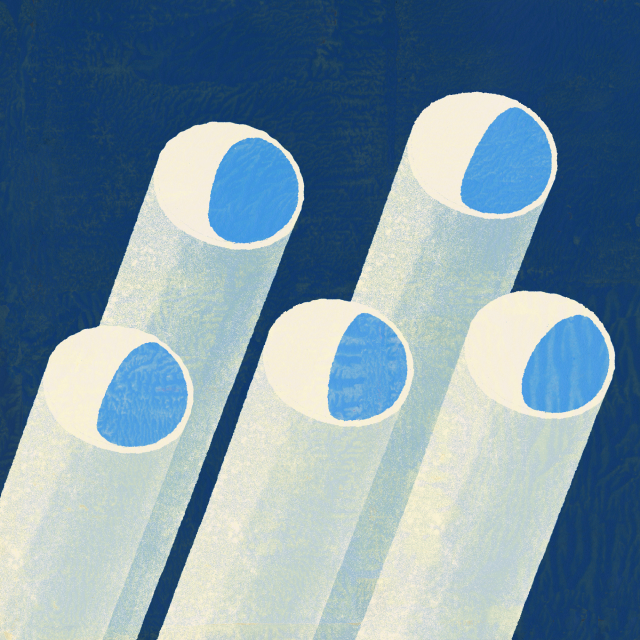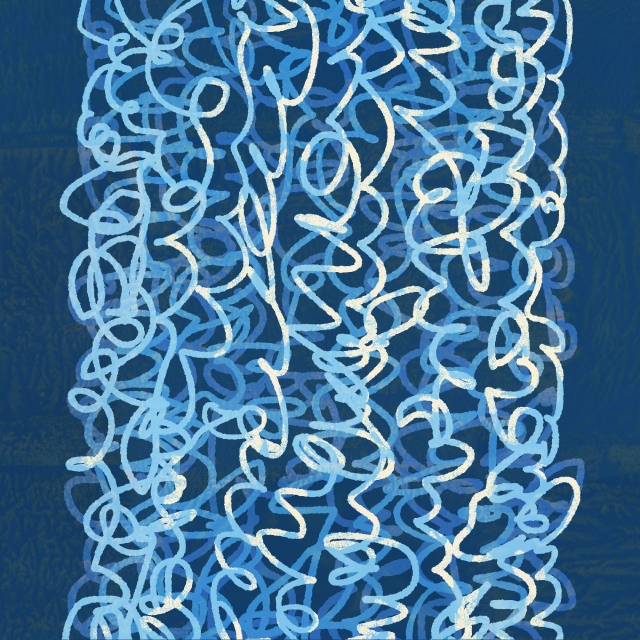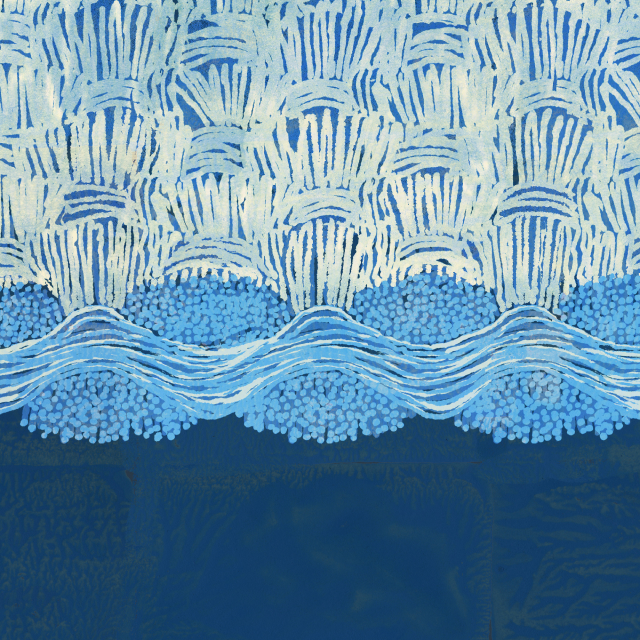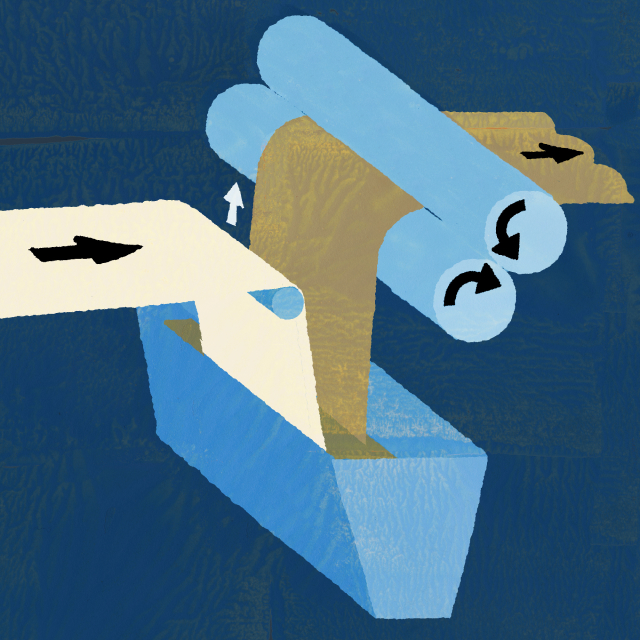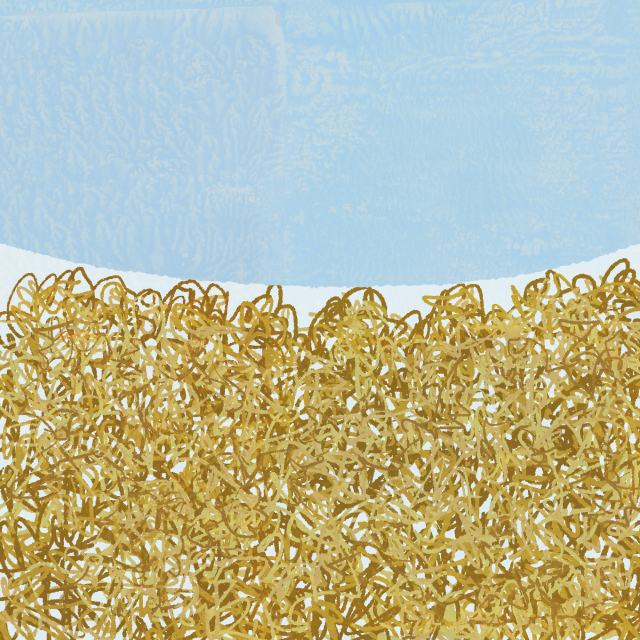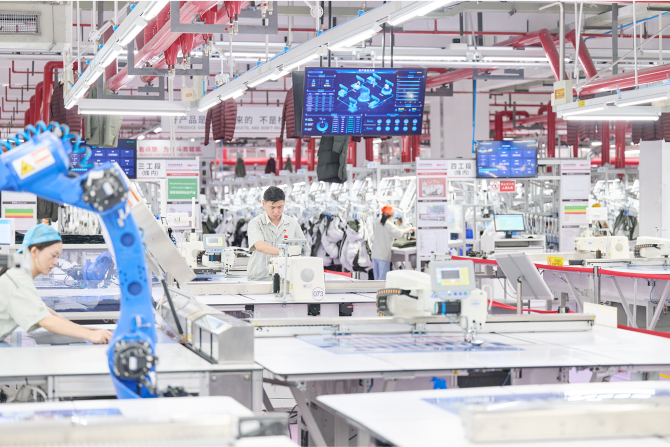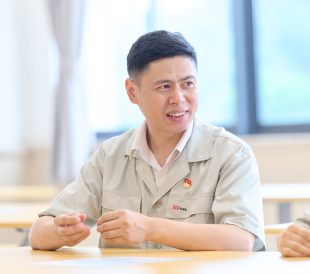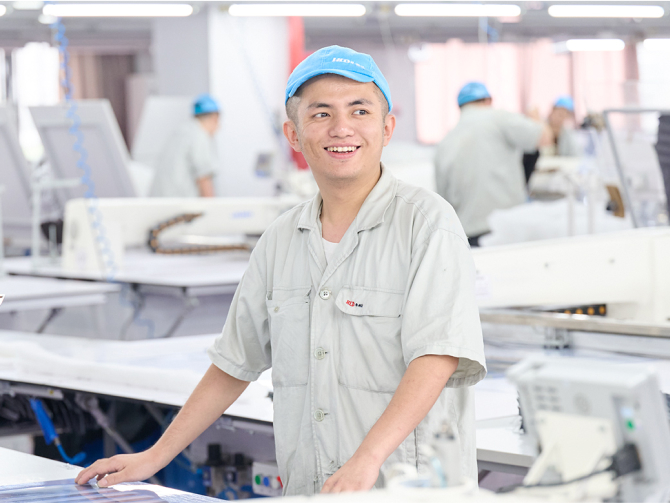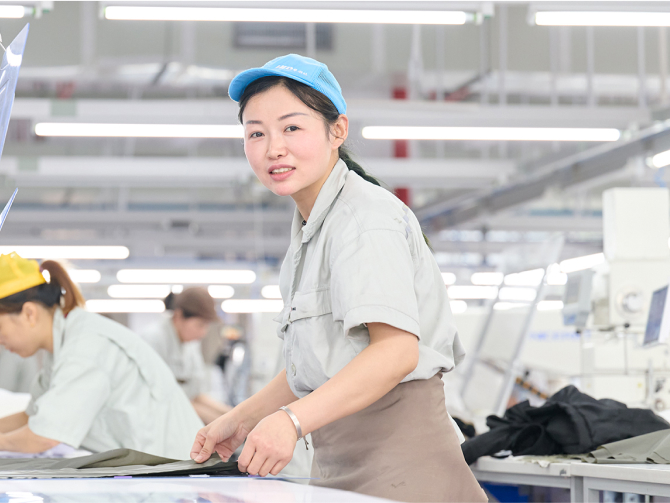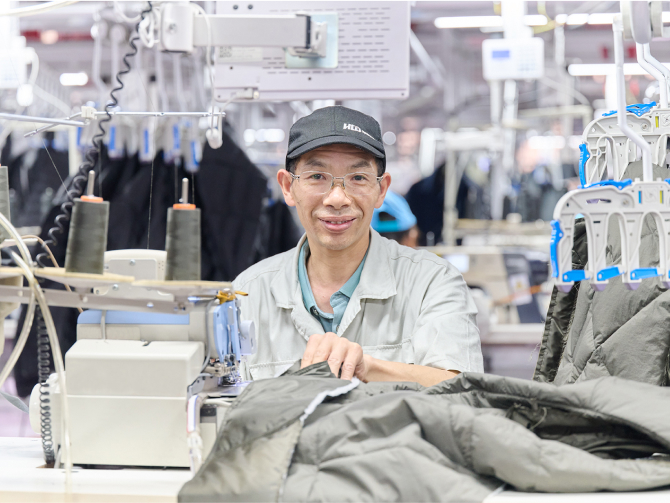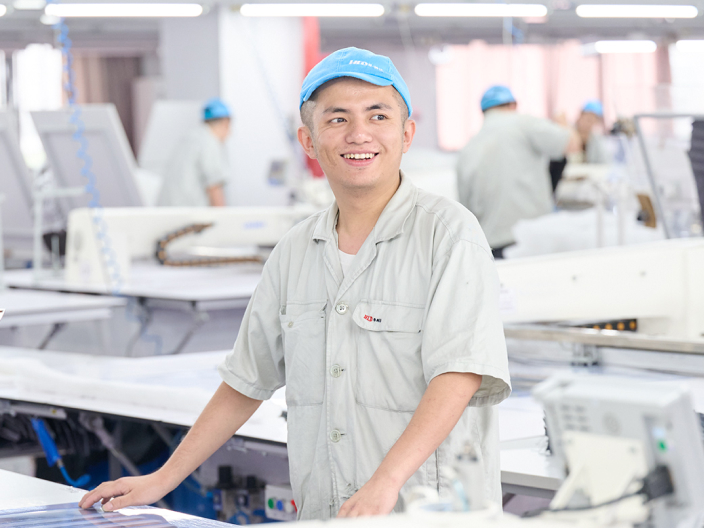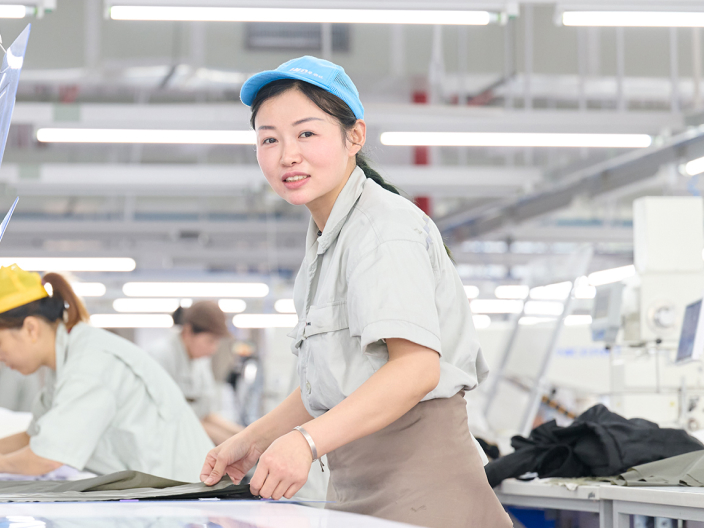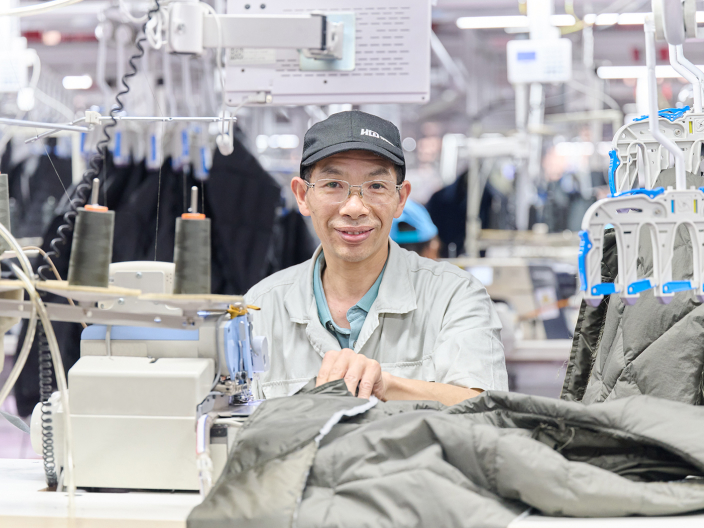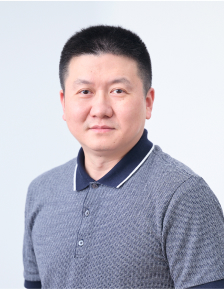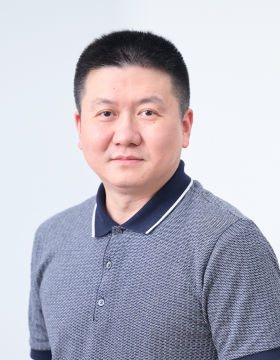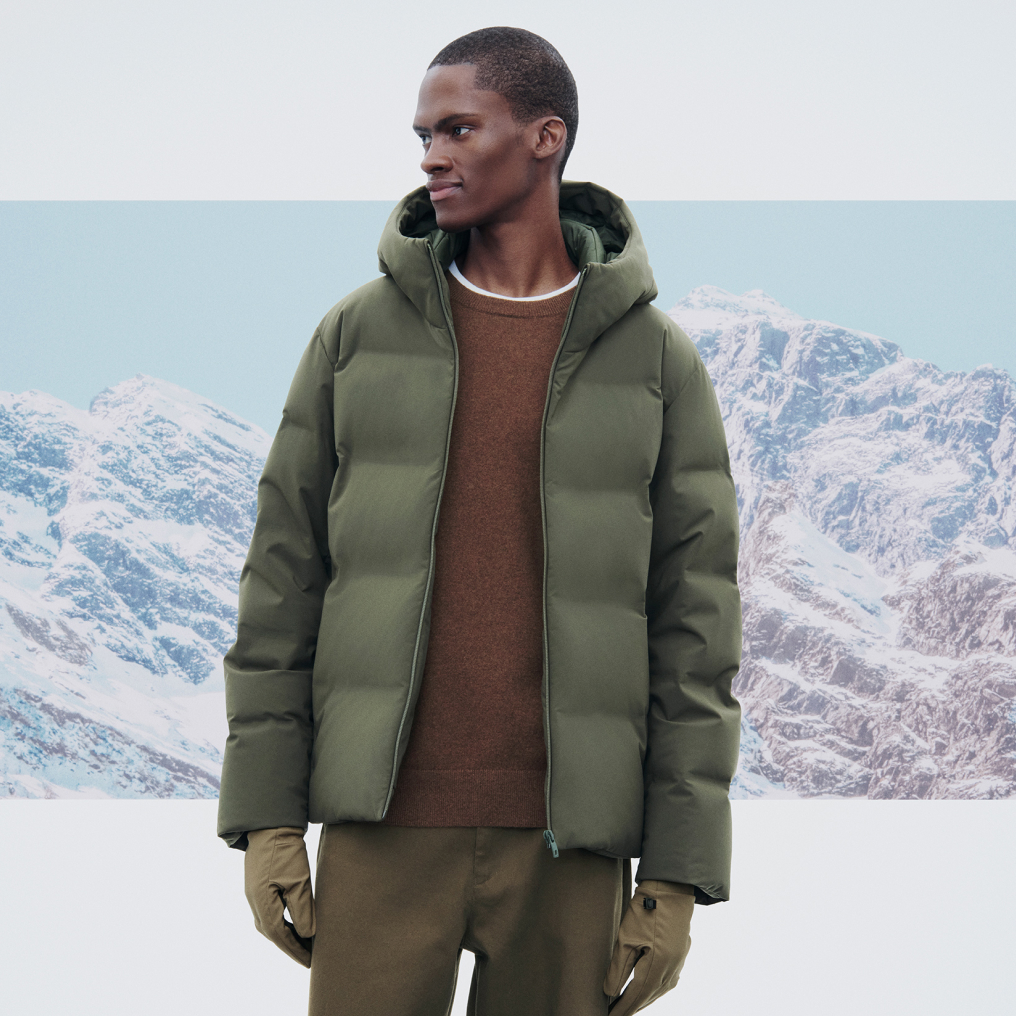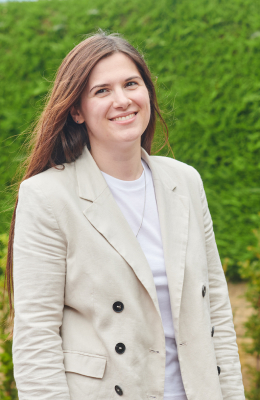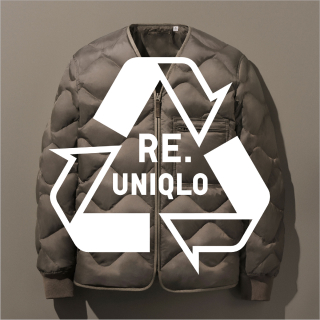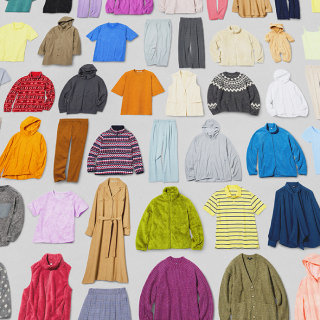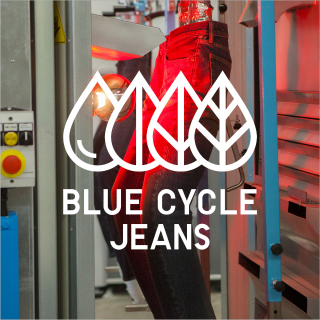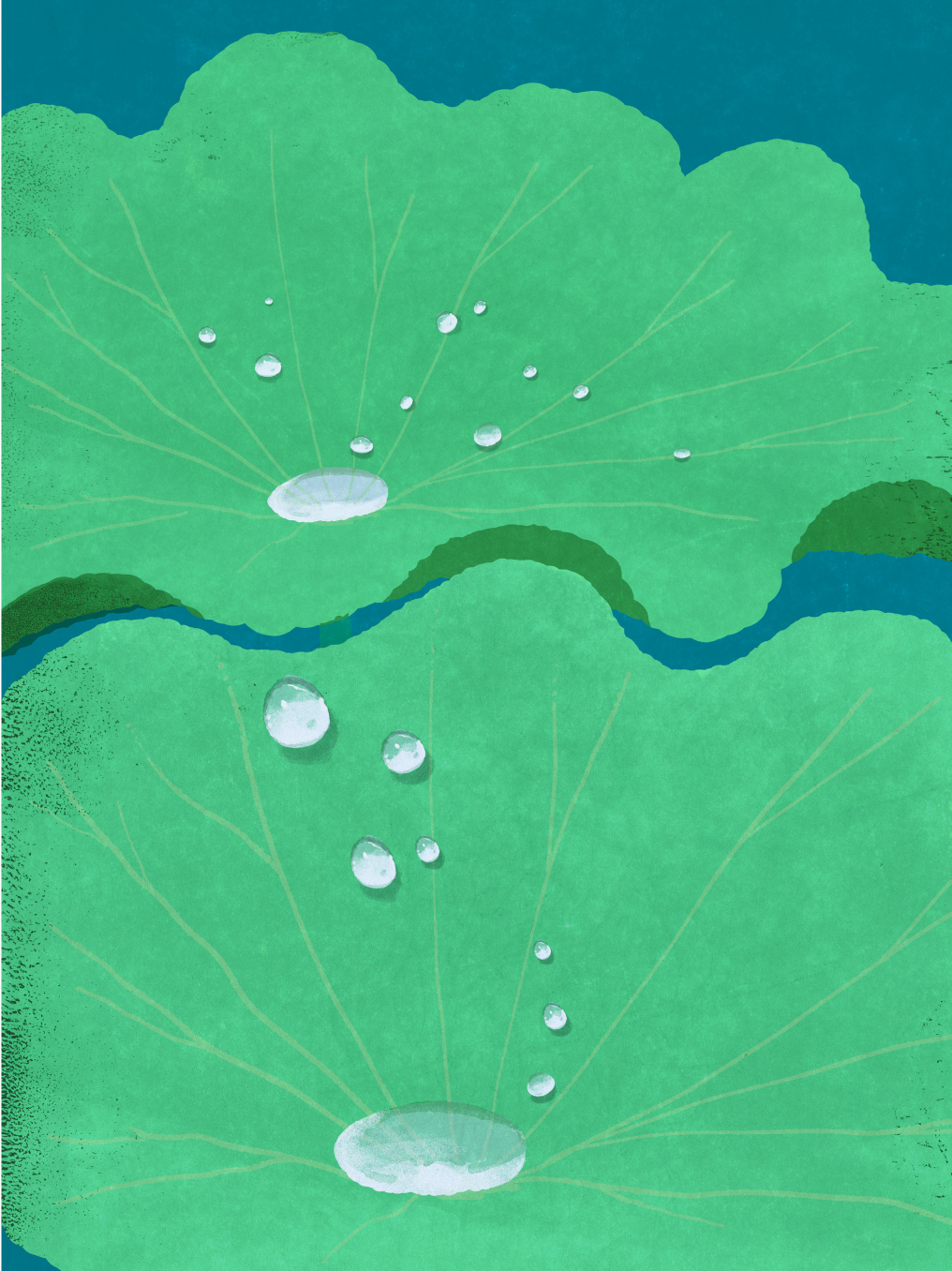
THE POWER OF
CLOTHING
June 2024 No.26
Wandering the streets looking distraught, he heard a voice ask,“Is something wrong?”
A former colony of Belgium that has since gained independence, the Democratic Republic of the Congo is fraught with civil war and social unrest, with large numbers of people fleeing the country.
Oppression in his homeland made it impossible for Masamba to live his life. He used to teach geography and math. 16 years ago, his friend in the civil service urged him to seek refuge in Japan.
Photographs by Shinsuke Kamioka
We spoke with Masamba in the employees-only area of the store. He’s a patient listener and gentle speaker.
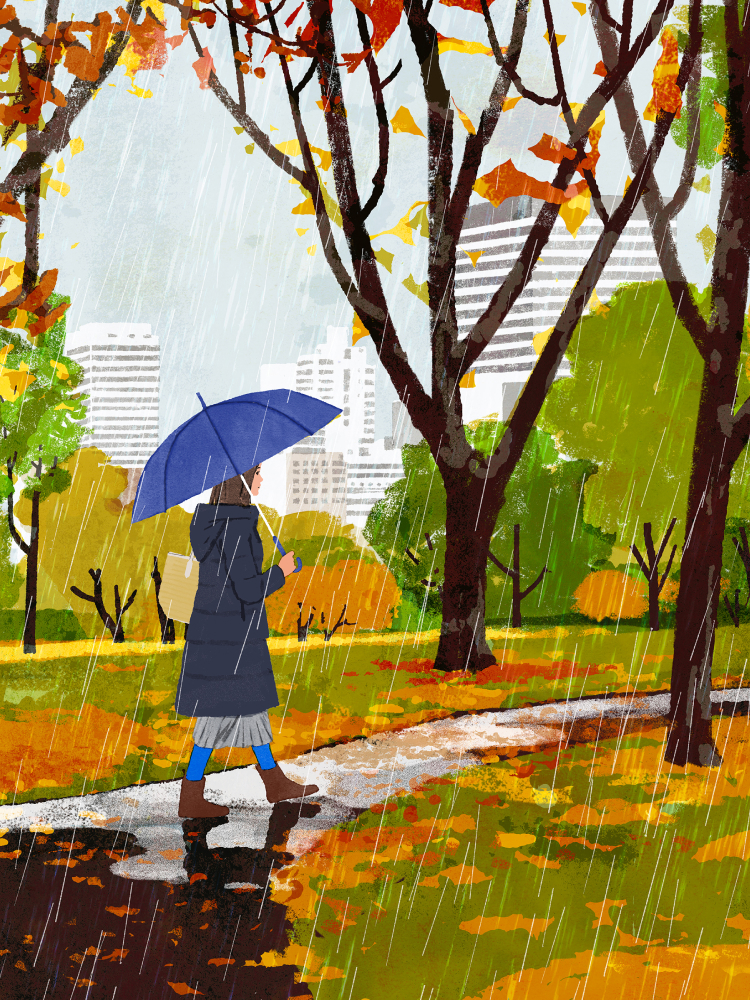
-
❶
Leaving the Democratic Republic of the Congo where he was born, Masamba took a series of flights that landed him in Japan. He had no friends or family, he couldn’t speak the language. He’d booked a night in a hotel in Ginza, but knew he had to find a cheaper place to stay while he applied for refugee status, though he had no idea where to go or how to start the process. This was 2008, so he didn’t have a smartphone.
-
❷
-
❸
-
❹
-
❺
-
Leaving the Democratic Republic of the Congo where he was born, Masamba took a series of flights that landed him in Japan. He had no friends or family, he couldn’t speak the language. He’d booked a night in a hotel in Ginza, but knew he had to find a cheaper place to stay while he applied for refugee status, though he had no idea where to go or how to start the process. This was 2008, so he didn’t have a smartphone.
The next morning, he checked out of the hotel and dragged his suitcase around Ginza. He must have looked out of sorts, because a Japanese man approached him and asked him in English, “Is something wrong? Are you trying to find something?”
His face was kind, so he smiled and responded.
“I’m hoping you can tell me where to register for refugee status with the UN.”
“We’ll figure this out,” the man told him and brought him back to his company’s office. This man and his coworkers looked up the address and called ahead, then gave him an address on a piece of paper.
“Here’s where you need to go,” they said. “Are you okay taking the subway by yourself?”
“I just arrived yesterday. I have no idea how things work here.”
“Do you have any money?”
“A little.”
“Okay, then hand this address to a taxi driver, they’ll get you there.” The man called him a taxi.*Agents Classified by the IARC Monographs, Volumes 1–136
-
Democratic Republic of the Congo (Referenced from the data of the Ministry of Foreign Affairs of Japan)
Located in the middle of Africa, this country ranks 11th globally in terms of area. Climates range from glacial mountains at the eastern border to tropical rainforests, plateaus, and sprawling basins. Located in the Congo River Basin, the capital of Kinshasa is a modern city with a population comparable to central Tokyo. Dictatorship has given way to civil war, and according to estimates from UNHCR, over eight million people have fled their home.
-
History
A colonial possession of Belgium in the 20th century, gaining independence in 1960. Soon after, assassinations and coups divided the nation, which remains riven by conflict. Renamed the Republic of Zaire in 1971, the Democratic Republic of the Congo was given its current name in 1997, though political unrest continues.
-
Economy
One of the poorest countries in the world, though rich in mineral resources. According to Mineral Commodity Summaries 2024, the nation ranks first globally in cobalt deposits, fourth in copper, and eighth in tin, but with most profits being fed into armed conflicts, civilians benefit little from this wealth.
-
With a diversity of cultural groups and languages, as well as the imprint left by years under Belgian rule, and a population which is about 80% Christian, this country cannot be easily reduced to one cultural symbol. The education system remains fraught with issues.
Futon Culture Shock
-
Leaving the Democratic Republic of the Congo where he was born, Masamba took a series of flights that landed him in Japan. He had no friends or family, he couldn’t speak the language. He’d booked a night in a hotel in Ginza, but knew he had to find a cheaper place to stay while he applied for refugee status, though he had no idea where to go or how to start the process. This was 2008, so he didn’t have a smartphone.
The next morning, he checked out of the hotel and dragged his suitcase around Ginza. He must have looked out of sorts, because a Japanese man approached him and asked him in English, “Is something wrong? Are you trying to find something?”
His face was kind, so he smiled and responded.
“I’m hoping you can tell me where to register for refugee status with the UN.”
“We’ll figure this out,” the man told him and brought him back to his company’s office. This man and his coworkers looked up the address and called ahead, then gave him an address on a piece of paper.
“Here’s where you need to go,” they said. “Are you okay taking the subway by yourself?”
“I just arrived yesterday. I have no idea how things work here.”
“Do you have any money?”
“A little.”
“Okay, then hand this address to a taxi driver, they’ll get you there.” The man called him a taxi.*Agents Classified by the IARC Monographs, Volumes 1–136
-
Democratic Republic of the Congo (Referenced from the data of the Ministry of Foreign Affairs of Japan)
Located in the middle of Africa, this country ranks 11th globally in terms of area. Climates range from glacial mountains at the eastern border to tropical rainforests, plateaus, and sprawling basins. Located in the Congo River Basin, the capital of Kinshasa is a modern city with a population comparable to central Tokyo. Dictatorship has given way to civil war, and according to estimates from UNHCR, over eight million people have fled their home.
-
History
A colonial possession of Belgium in the 20th century, gaining independence in 1960. Soon after, assassinations and coups divided the nation, which remains riven by conflict. Renamed the Republic of Zaire in 1971, the Democratic Republic of the Congo was given its current name in 1997, though political unrest continues.
-
Economy
One of the poorest countries in the world, though rich in mineral resources. According to Mineral Commodity Summaries 2024, the nation ranks first globally in cobalt deposits, fourth in copper, and eighth in tin, but with most profits being fed into armed conflicts, civilians benefit little from this wealth.
-
With a diversity of cultural groups and languages, as well as the imprint left by years under Belgian rule, and a population which is about 80% Christian, this country cannot be easily reduced to one cultural symbol. The education system remains fraught with issues.
Futon Culture Shock
Arriving in Shibuya, Masamba tried to pay the cab fare in US dollars, but the driver looked upset and said, “I can’t take those.” But that was all he had, so the driver took him to a bank. As he was filling out the currency exchange forms, another African approached him. “Is something wrong?” they asked. When Masamba explained, the other African said “This address is the branch of the UN that provides aid to refugees, you can’t apply for refugee status there.” After settling up with the cab driver, he went with the African to the nearest police station.
The officer on duty gave him some helpful instructions. “Head over to JAR (Japan Association for Refugees),” he said, then gave him a new address and called another taxi. At JAR, Masamba received instructions on how to apply for refugee status at the immigration office. They also gave him a map of Tokyo, some info on life in the city, and provided a place for him to stay in the short term. At the dorm, he was baffled to discover that he wouldn’t be sleeping in a room with a bed, but on a futon laid out on the tatami floor. He’d never seen a futon in his life. But thanks to the kindness of strangers, his second day in Japan, a very long day, had come safely to a close.
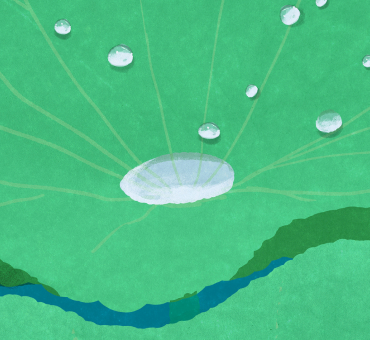
Escaping a War-Torn Homeland
I was born in 1975 in Mbanza-Ngungu, a city in the western part of Congo. About 100 kilometers southwest of the capital city of Kinshasa, it’s home to Kongo University and has about 100,000 people. Though Congo is now free from colonial rule, it has continued to experience conflict, assassinations and coups, resulting in a large number of deaths and a steady stream of people leaving the country.

Over 30% of the staff at UNIQLO GINZA are from overseas. There are many different perspectives.
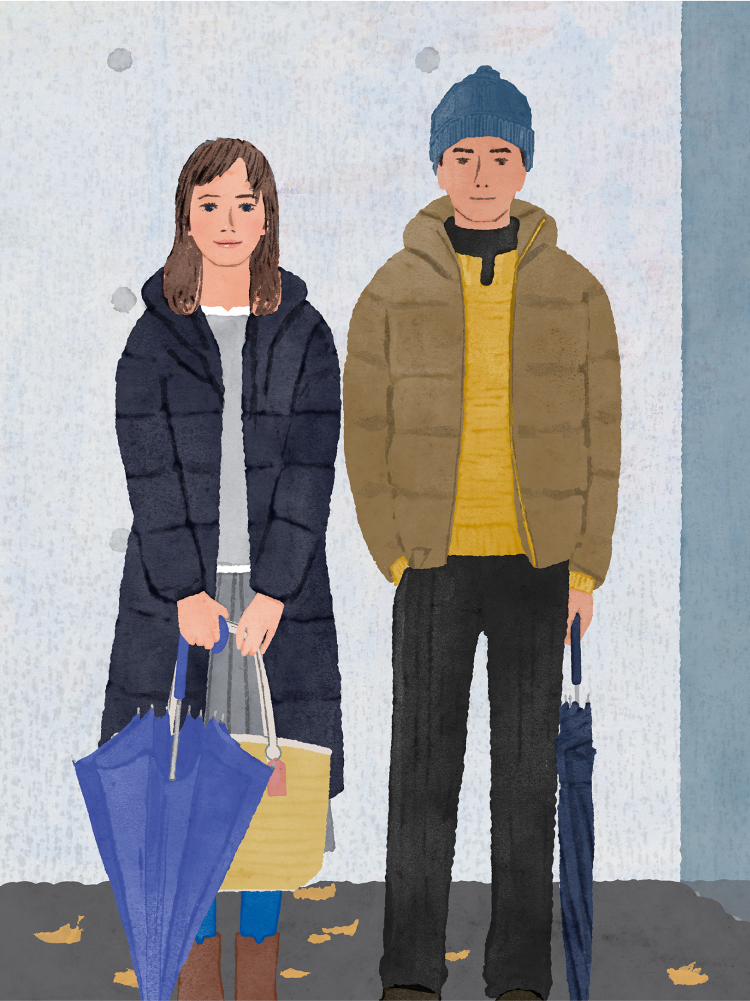
-
1
Thidar, who looks after the women’s floor, is pictured explaining UTme! to some curious customers.
-
2
On weekday afternoons, all 12 floors of the Ginza store are full of customers from all over the world. A reflection of the diverse staff.
-
3
Good question. Listen to the chatting customers, and you’re likely to hear English along with many other languages. The sight of customers feeling at home and of the staff helping them out gives the store a peaceful atmosphere.
-
4
Applied for Asylum to No Avail
-
5
Myanmar was colonized by Britain in the late nineteenth century. The state was later occupied by Japan during World War II. Then in 1948, in the wake of the war, they declared independence as the Union of Burma (to be renamed Union of Myanmar by the military government in 1989).
-
6
When the dictatorship banned civilian demonstrations in 2007, Thidar, who was concerned for her safety, reached out to her sister and brother-in-law, who were already living in Japan, and she left Myanmar behind.
Once she was in Japan, she applied for refugee status at the immigration office, but was declined. All she was able to obtain was a “Designated Activities” visa. Visas issued by the Ministry of Justice permit certain kinds of work for periods ranging from three months to five years. In Thidar’s case, hers was for six months. Before the period was up, she could visit the immigration office and sit for an interview. If her situation was deemed exceptional, she could receive an extension.
Thidar was able to renew her six-month visa several times. Later, it was renewed in one-year increments. In her sixth year in Japan, she was finally granted refugee status.
-


In the meantime, she had worked at a hamburger shop and at a yakitori restaurant. Early on, because she couldn’t read Japanese, it was a struggle to learn the menu and take orders without making mistakes. Interacting with customers taught her that to live and work in Japan, she would need a strong command of the language. A friend pointed her in the direction of the social welfare foundation Support21, which specializes in helping refugees become independent. They also offer Japanese classes, which she started attending, dedicating much of her free time to her studies.
-


Morning meeting on the 12th floor of UNIQLO GINZA. This was a special morning, since they celebrated one staff member’s 10-year anniversary.
-


UNIQLO is Recommended in Japanese Class
-


As she struggled to find her way, Thidar heard that her mother back in Myanmar had fallen ill. Since she had to send home money for the medical expenses, things were very tight financially for a time. This is when she began yearning for a more stable source of income and a calmer way of life.
-


One day, her Japanese language teacher asked her, “Thidar, would you ever work at UNIQLO?” She liked fashion and was interested in the work. Thidar took this recommendation as a reassuring sign that her Japanese skills were improving. Support21 provided guidance on writing resumes and filling out applications, helping her put everything together.
-


Once she was selected by the RISE Program, Thidar interviewed with a teacher, who deemed her Japanese abilities to be adequate. Soon after, she started working, while attending special RISE Program language classes on the side. Thidar says she still remembers the mix of relief and anxiety she felt.
UNIQLO support programs for refugees were launched in 2011. The company, its stores, and staff have gained a wealth of experience. Over time, a philosophy has emerged—acknowledging that everyone’s experience is different, you can communicate with refugees the same as with the rest of the staff, without too much special treatment, so that they become accustomed to the nature of the job.

-
Maintaining human dignity, walking together, and helping one another.
Ayaki Ito
In the seven decades since UNHCR, the UN Refugee Agency, was formed to provide relief and solutions for refugees escaping the devastation caused by WWII in Europe, the global refugee situation has changed significantly. The number of people forced to flee their homes due to conflict, persecution, violence, or human rights violations has now reached 110 million worldwide.
-

-

In countries hosting refugees, generosity towards them is being challenged. Even countries that historically served as significant sources of emotional and material support for the refugee cause have, in recent years, faced challenges in providing sufficient assistance. In the 21st century, we’ve also seen a shift away from multilateral international cooperation towards inward-looking unilateralism. Today, we frequently hear of concern and anxiety that refugees might drive domestic tensions and cause divisions.
I imagine that in Japan, when people hear the word “refugee,” many still have sympathy towards them but think that there is nothing they can do and perceive it as an insurmountable problem. Additionally, when people hear words like “civil war” and “politics,” they may think it is better to stay away from the issue.
Postwar Japan has never experienced a civil war-like situation. And yet, every person in Japan can imagine a situation where they suddenly lose their homes due to natural disasters, like a massive earthquake, and have to live in a challenging situation after evacuation.
In this sense refugees are not so different. They are people who had ordinary lives but were suddenly deprived of them and forced to flee their homes. Putting ourselves in their shoes in this way helps us better understand their plight.
-

In countries hosting refugees, generosity towards them is being challenged. Even countries that historically served as significant sources of emotional and material support for the refugee cause have, in recent years, faced challenges in providing sufficient assistance. In the 21st century, we’ve also seen a shift away from multilateral international cooperation towards inward-looking unilateralism. Today, we frequently hear of concern and anxiety that refugees might drive domestic tensions and cause divisions.
I imagine that in Japan, when people hear the word “refugee,” many still have sympathy towards them but think that there is nothing they can do and perceive it as an insurmountable problem. Additionally, when people hear words like “civil war” and “politics,” they may think it is better to stay away from the issue.
Postwar Japan has never experienced a civil war-like situation. And yet, every person in Japan can imagine a situation where they suddenly lose their homes due to natural disasters, like a massive earthquake, and have to live in a challenging situation after evacuation. -
In this sense refugees are not so different. They are people who had ordinary lives but were suddenly deprived of them and forced to flee their homes. Putting ourselves in their shoes in this way helps us better understand their plight.
-

As a humanitarian agency, UNHCR provides immediate support for displaced people in countries stricken by conflict, or in the neighboring countries they flee to.
-

But this doesn’t solve everything. In situations where people cannot return home, or where they seek a new life in a place with a different language and culture, the national and local governments need to work with experienced organizations to develop strategies to help and welcome them into society. Otherwise, refugees will quickly become isolated and unable to make a living. Unless they are supported by both the hosting government and society as a whole, refugees will not have a stable future.
-

I have great faith in the power of the private sector. I’m hoping that more companies can follow the example set by UNIQLO’s Refugee Inclusion Supporting and Empowerment (RISE) Program, which helps refugees become self-reliant. The program creates a foundation for refugees to learn the language, culture, and customs needed to live independently, and actively participate in the betterment of the local community as contributing members of society. Deepening mutual understanding and uplifting one another will bring positive effects far greater than we can imagine.
-

Once refugees start working and gain a place in the community, the word “refugee” becomes an unnecessary identifier. To maintain human dignity, we need to support and walk alongside each other. By helping refugees fully demonstrate their abilities, we help enrich our own communities across the board.
-

Automating the packing process frees up the hands of workers.
-

An automated sewing machine. Monitored by human hands.
-
As a humanitarian agency, UNHCR provides immediate support for displaced people in countries stricken by conflict, or in the neighboring countries they flee to.

-
But this doesn’t solve everything. In situations where people cannot return home, or where they seek a new life in a place with a different language and culture, the national and local governments need to work with experienced organizations to develop strategies to help and welcome them into society. Otherwise, refugees will quickly become isolated and unable to make a living. Unless they are supported by both the hosting government and society as a whole, refugees will not have a stable future.

-
I have great faith in the power of the private sector. I’m hoping that more companies can follow the example set by UNIQLO’s Refugee Inclusion Supporting and Empowerment (RISE) Program, which helps refugees become self-reliant. The program creates a foundation for refugees to learn the language, culture, and customs needed to live independently, and actively participate in the betterment of the local community as contributing members of society. Deepening mutual understanding and uplifting one another will bring positive effects far greater than we can imagine.

-

Once refugees start working and gain a place in the community, the word “refugee” becomes an unnecessary identifier. To maintain human dignity, we need to support and walk alongside each other. By helping refugees fully demonstrate their abilities, we help enrich our own communities across the board.
-

Automating the packing process frees up the hands of workers.
-

An automated sewing machine. Monitored by human hands.
-
Making high-quality seamless down using a blend of automated processes and manual labor.

Li Haijiao
Vice President, Changzhou Hualida Garment Group Co., Ltd.
It takes 50 or so steps to make a T-shirt, but making seamless down takes around 200. To execute all of these steps, you need highly precise machinery.
Working off our experience making ultra light down for UNIQLO, we started making seamless down in 2015, so at this point we possess a rich store of knowledge, experience, and skill. But since we know there’s still room for improvement, we turn to our staff for their proposals and opinions, which helps us always see what we do with a fresh set of eyes as we aim for increased quality.
Our company also produces lifesaving products like the airbags used in cars, earning us a strong reputation for quality, precision and durability that extends beyond the world of apparel.
-
Making high-quality seamless down using a blend of automated processes and manual labor.
Li Haijiao
Vice President, Changzhou Hualida Garment Group Co., Ltd.
-
It takes 50 or so steps to make a T-shirt, but making seamless down takes around 200. To execute all of these steps, you need highly precise machinery.
Working off our experience making ultra light down for UNIQLO, we started making seamless down in 2015, so at this point we possess a rich store of knowledge, experience, and skill. But since we know there’s still room for improvement, we turn to our staff for their proposals and opinions, which helps us always see what we do with a fresh set of eyes as we aim for increased quality.
Our company also produces lifesaving products like the airbags used in cars, earning us a strong reputation for quality, precision and durability that extends beyond the world of apparel.
-
Improving work environment through the latest technologies and equipment
Sustainability is central to the manufacture of all UNIQLO products. By establishing and sharing concrete goals for improving work environments, reducing CO2 emissions, and using recycled materials, incremental improvements have been made nearly every year.
One initiative that reduces strain on workers and increases efficiency is the introduction of equipment using the latest technology. For example, all you have to do is scan a pattern and the digitally controlled automated cutting machines can cut fabric with a high degree of precision. This work was previously all done by hand.
Up until about fifteen years ago, down was stuffed into the products by hand as well. At the end of the day, workers would be covered in feathers. Thanks to the introduction of specialized filling machines, the work is executed with greater precision and efficiency, improving the factory atmosphere for all. Loss per item is now less than 0.01 grams of down. The machines are always being updated to make use of the latest technology.
Ensuring steady employment
A key issue in the apparel world is navigating the slumps and rushes caused by the seasonal collection cycle. For a factory like ours specializing in outerwear, a slower period in the spring and summer is unavoidable. For years, we’ve been working on ways to ensure a steady stream of orders throughout the year.
Using the latest technology and equipment has gone a long way toward fulfilling this goal. That’s because these machines are able to take on more difficult tasks, allowing us to produce a wider array of products. This is part of how we’re working to ensure steady employment throughout the year.
-
Machines made for seamless down
Water-repellent finishes that don’t use fluorine are vulnerable to oils. Seamless down uses blocks that hold the down inside thanks to a containment process called thermo-compression bonding. This means there are no seams around the blocks, but sewing machines are still needed to assemble all the pieces.
To avoid any adverse reaction from stray flecks of machine lubricant, these items are made using special machines that require almost no oiling. Even the thread has been specially developed for seamless down products.
Workers mean everything to us.
UNIQLO products are sold all over the world. The item a customer picks up in one store has to be the exact same quality in all the stores all over the world. Variation is out of the question. Maintaining a high standard of quality is what keeps a global brand alive.
As mentioned earlier, it takes over 200 steps to make a seamless down product. Ahead of the thermo-compression bonding step, for example, it’s of great importance that the parts be manually prepared by human hands. A worker’s eyes and other senses are essential to maintaining quality throughout the production process. For the time being, inspection is best left to people.
Rather than automate everything, it’s important to have people look things over to ensure a quality final product. This is one of the things we’re most proud of as a manufacturer.
Workers mean everything to us. Their value is what guides us as the factory continually evolves into an ever-more efficient and productive facility.
Made by people, made for people—working toward a richer and more vibrant life for all.
UNIQLO’s clothing is produced mainly at a handful of partner factories in Asia. These relationships depend on robust dialogue throughout the production process, whether it’s ensuring the health, safety and rights of the employees,or monitoring product quality, monitoring product quality, or evaluating the terms of the account. It’s about fostering an environment where a diverse group of employees can thrive and make good clothes. By good clothing, we mean simple, safe, high-quality clothing that is built to last and improve your life. As a clothing business, we’re focused on continually establishing new standards and raising the bar for quality across the industry, setting an example for sustainable development.
Less seams. More warmth.
Seamless Down
- English
- Tiếng Việt

June 2024 No.26
Originally from the Democratic Republic of the Congo, Masamba now works at UNIQLO GINZA.
READ MORE
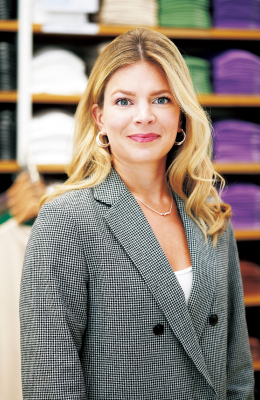
October 2023 No.25
The Most Beloved Brand in Scandinavia
Nikolina Johnston, the force behind UNIQLO’s first store in Stockholm, was once a right winger on the soccer field.
READ MORE
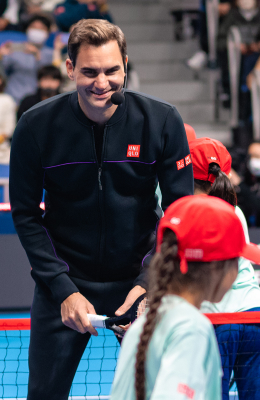
January 2023 No.24
Empowering Children to Build Their Future
Tennis legend Roger Federer and Tadashi Yanai discussed the importance of helping kids.
READ MORE





